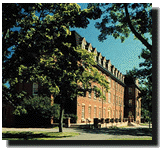
 In the
nineteenth century, when Prince Edward Island communities
were first being settled, the first public building
constructed (after the church, of course) was the
schoolhouse. For many years, and well into the twentieth
century, the local school was a source of pride for
communities and a hub of cultural life. Kensington’s
first school opened in 1847, with John McLauchlen taking
responsibility for teaching. This early school had an
enrolment of 40, though only 30 students attended
regularly.
In the
nineteenth century, when Prince Edward Island communities
were first being settled, the first public building
constructed (after the church, of course) was the
schoolhouse. For many years, and well into the twentieth
century, the local school was a source of pride for
communities and a hub of cultural life. Kensington’s
first school opened in 1847, with John McLauchlen taking
responsibility for teaching. This early school had an
enrolment of 40, though only 30 students attended
regularly. No matter which course they are taking, Island students today have the opportunity to learn something about Prince Edward Island and its place in the world. Classes in English, French, history, geography, science, environmental studies, law, political science, business, physical education, and music, as well as extracurricular activities in theatre, sport, student government, or student organizations provide young Islanders with the opportunity to learn about how they fit into their community, their culture, and the political system. This, of course, is a characteristic true of schools anywhere in Canada. In Prince Edward Island, we get the very real sense that we do have a place; we belong to Prince Edward Island and it belongs to us. In an expanding global community, that anchor of home may be the one thing that stays constant.
In the early 1970s, Prince Edward Island’s small local boards were dissolved to make way for larger administrative units. Today, three regional school boards manage the elementary and secondary schools of the province. Privately operated nursery schools and kindergartens start many Island children on their scholastic careers. Grades 1 through 6 are generally spent at an elementary school, grades 7 through 9 at an intermediate school, and grades 10 through 12 at a high school. Beginning first grade at age 5 or 6, students complete their studies at 17 or 18 years of age. Kensington area students attend Queen Elizabeth Elementary, which teaches grades 1 through 6 and has an enrolment of 470. Kensington Intermediate-Senior High incorporates grades 7 through 12 and has a student population of 456.
All 66 schools and 24 public libraries on the Island are electronically linked to the province-wide broadband network with direct access to the Internet. The availability of this resource opens an unprecedented array of research, exploration, and extra-curricular opportunities.
The French Immersion program, in which the language of instruction is French, began in Prince Edward Island in 1975. This program creates the opportunity for students to learn conversational French in a more concentrated way than the regular core French classes offered as part of the curriculum. Students enrolled in French Immersion can follow the program from grades 1 through 12 or from grades 7 through 12.
 Prince Edward
Island’s community college, Holland College, has
eleven training centres across the Island as well as an
Island-wide “virtual campus.” In all, the
College offers more than 73 programs in the fields of
adult education, business administration and
entrepreneurship, computer studies, carpentry,
electromechanical/engineering, environment/marine, health
science/community services, industrial trades and
technologies, and media and communications. The Justice
Institute of Canada and the Atlantic Tourism and
Hospitality Institute together with the Culinary
Institute of Canada are also a vital part of Holland
College’s array of skills-based programs.
Prince Edward
Island’s community college, Holland College, has
eleven training centres across the Island as well as an
Island-wide “virtual campus.” In all, the
College offers more than 73 programs in the fields of
adult education, business administration and
entrepreneurship, computer studies, carpentry,
electromechanical/engineering, environment/marine, health
science/community services, industrial trades and
technologies, and media and communications. The Justice
Institute of Canada and the Atlantic Tourism and
Hospitality Institute together with the Culinary
Institute of Canada are also a vital part of Holland
College’s array of skills-based programs. Admirably, the University of Prince Edward Island (U.P.E.I.) offers a rich blend of academic programs in the arts, sciences, business, education, nursing, music, and veterinary medicine. It
 also offers a master’s
degree in education as well as masters and doctoral
degree programs in veterinary medicine through the
Atlantic Veterinary College (AVC). The AVC, established
in 1990, is both a teaching institution and a research
centre that serves the entire Atlantic region and has
developed an international reputation in the field of
aquaculture. The university is also noted for its
research centres and partnerships. These include, among
others, the L. M. Montgomery Institute, the Institute of
Island Studies, the North Atlantic Islands Programme, the
Island Sustainability Livelihood and Equity Program
(ISLE), the Centre for Conflict Resolution Studies, the
Knowledge Economy Partnership, the Information Technology
in Education Centre (ITEC), the Canadian Aquaculture
Institute, and Atlantic Fish Health.
also offers a master’s
degree in education as well as masters and doctoral
degree programs in veterinary medicine through the
Atlantic Veterinary College (AVC). The AVC, established
in 1990, is both a teaching institution and a research
centre that serves the entire Atlantic region and has
developed an international reputation in the field of
aquaculture. The university is also noted for its
research centres and partnerships. These include, among
others, the L. M. Montgomery Institute, the Institute of
Island Studies, the North Atlantic Islands Programme, the
Island Sustainability Livelihood and Equity Program
(ISLE), the Centre for Conflict Resolution Studies, the
Knowledge Economy Partnership, the Information Technology
in Education Centre (ITEC), the Canadian Aquaculture
Institute, and Atlantic Fish Health.Police | Fire | Health | Waste Management | Government